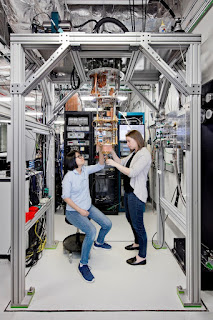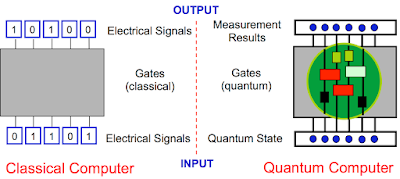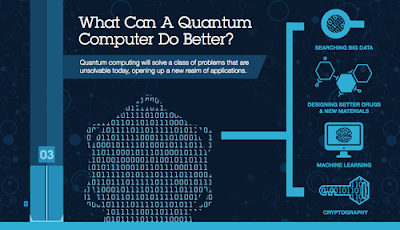Twitter Feed
Quantum Computing Delivered From The Cloud
Photo credit: Shutterstock IBM Cloud is now providing developers with the infrastructure and portal to a 5 qubit quantum computer. This equips them with the ability to build interfaces between…
Connections Redefining the Enterprise Network
Photo credit: Shutterstock The computer and the network that connects them are both inextricably linked to the success of any business. This truth is at the heart of our contemporary…
Business Chatbots Taking Over
Chat apps characteristics make them very appealing to businesses and marketers. Prominent ones include their size, user retention, usage rates, and user demographics. In fact, the combined user base of…
NCTA CloudMASTER®: The Path To Your Future
In 2016, cloud computing started to dominate many IT market segments. As a business, Synergy Research Group reported that industry revenue for the four quarters ended Sept. 30 grew 25%.…
Cybersecurity in the President Trump Administration
From the rise of increasingly capable nation-states—like Iran and North Korea—conducting destructive attacks against American private sector companies, to the continuing pace of IP theft by China striking at the…
Creating Your Digital Strategy
Photo credit: Shutterstock For many corporations, welcoming the New Year also heralds the season of strategy development and budget distribution. This year, however, companies of all sizes are struggling with…
CloudMASTER® Pays Well In The US Great Northwest
The City of Beaverton is located seven miles west of Portland, Oregon, in the Tualatin River Valley, It encompasses 19.6 square miles, and is home to more than 95,000 residents.…
NATO ACT “Art of the Possible” Interoperability Demonstration
GovCloud Network is proud to have served as the Program Manager for the NATO Allied Command Transformation, “Art of the Possible” Interoperability Demonstration on December 16, 2016. supporting the The…
Olisipo Can Make You A CloudMASTER®
Olisipo Learning in Portugal has a culture that is based on the constant search for new challenges. Recognized by their clients as the “Best HR Supplier”, they have placed more…
What is Your 2017 Business Strategy?
Photo credit: Shutterstock End of year predictions in December are as predictable as tomorrow’s sunrise, but a recent video on 2017 Technology Trends helped me really understand how important a…
- The release of a new API (Application Program Interface) for the IBM Quantum Experience that enables developers and programmers to begin building interfaces between its existing five quantum bit (qubit) cloud-based quantum computer and classical computers, without needing a deep background in quantum physics.
- The release of an upgraded simulator on the IBM Quantum Experience that can model circuits with up to 20 qubits. In the first half of 2017, IBM plans to release a full SDK (Software Development Kit) on the IBM Quantum Experience for users to build simple quantum applications and software programs.
The IBM Quantum Experience enables anyone to connect to IBM’s quantum processor via the IBM Cloud, to run algorithms and experiments, work with the individual quantum bits, and explore tutorials and simulations around what might be possible with quantum computing. Since its launch less than a year ago, about 40,000 users have run over 275,000 experiments on the IBM Quantum Experience. It has become an enablement tool for scientists in over 100 countries and, to date, 15 third-party research papers have been posted to arXiv with five published in leading journals based on experiments run on the Quantum Experience.
 The broad availability of quantum computing capability could prove to be a significant blow to current data encryption practices. In 2015 the US National Security Agency actually advised US agencies and businesses to prepare for a time when the cryptography protecting virtually all e-mail, medical and financial records, and online transactions would be rendered obsolete by quantum computing. The US National Institute for Standards and Technology (NIST) is also running a competition to spur work on post-quantum algorithms.
The broad availability of quantum computing capability could prove to be a significant blow to current data encryption practices. In 2015 the US National Security Agency actually advised US agencies and businesses to prepare for a time when the cryptography protecting virtually all e-mail, medical and financial records, and online transactions would be rendered obsolete by quantum computing. The US National Institute for Standards and Technology (NIST) is also running a competition to spur work on post-quantum algorithms. - Drug and Materials Discovery: Untangling the complexity of molecular and chemical interactions leading to the discovery of new medicines and materials;
- Supply Chain & Logistics: Finding the optimal path across global systems of systems for ultra-efficient logistics and supply chains, such as optimizing fleet operations for deliveries during the holiday season;
- Financial Services: Finding new ways to model financial data and isolating key global risk factors to make better investments;
- Artificial Intelligence: Making facets of artificial intelligence such as machine learning much more powerful when data sets can be too big such as searching images or video; or
- Cloud Security: Making cloud computing more secure by using the laws of quantum physics to enhance private data safety.
This content is being syndicated through multiple channels. The opinions expressed are solely those of the author and do not represent the views of GovCloud Network, GovCloud Network Partners or any other corporation or organization.
( Thank you. If you enjoyed this article, get free updates by email or RSS – © Copyright Kevin L. Jackson 2017)
Cloud Computing
- CPUcoin Expands CPU/GPU Power Sharing with Cudo Ventures Enterprise Network Partnership
- CPUcoin Expands CPU/GPU Power Sharing with Cudo Ventures Enterprise Network Partnership
- Route1 Announces Q2 2019 Financial Results
- CPUcoin Expands CPU/GPU Power Sharing with Cudo Ventures Enterprise Network Partnership
- ChannelAdvisor to Present at the D.A. Davidson 18th Annual Technology Conference
Cybersecurity
- Route1 Announces Q2 2019 Financial Results
- FIRST US BANCSHARES, INC. DECLARES CASH DIVIDEND
- Business Continuity Management Planning Solution Market is Expected to Grow ~ US$ 1.6 Bn by the end of 2029 - PMR
- Atos delivers Quantum-Learning-as-a-Service to Xofia to enable artificial intelligence solutions
- New Ares IoT Botnet discovered on Android OS based Set-Top Boxes




